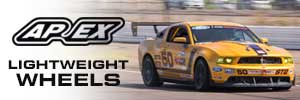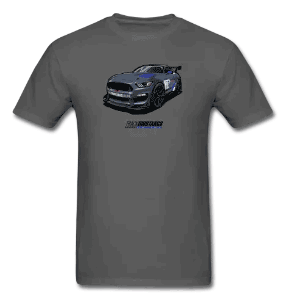- Welcome to the Ford Mustang forum built for owners of the Mustang GT350, BOSS 302, GT500, and all other S550, S197, SN95, Fox Body and older Mustangs set up for open track days, road racing, and/or autocross. Join our forum, interact with others, share your build, and help us strengthen this community!
You are using an out of date browser. It may not display this or other websites correctly.
You should upgrade or use an alternative browser.
You should upgrade or use an alternative browser.
wheel size benefit
- Thread starterjfolsom28
- Start date
This site may earn a commission from merchant affiliate links, including eBay, Amazon, and others.
More options
Who Replied?Most of these guys are tracking with race tires, which are 18". I think most race tires in our diameter range are only available up to 18". For street tires, 18" are cheaper in general and the wheels weigh less. The other plus to going down in wheel diameter is decreased rotational inertia. I switched to some light 18s and the Boss definitely feels different. The steering feels snappier from dropping the weight. But you do end up with a taller sidewall so the tire might flex a bit more when you get a side-load on it. In a car that you are actually trying to get good fuel economy with, it helps significantly to go to a smaller wheel. That is why I still have steelies on my DD. With the way most guys drive a Boss I doubt the fuel economy increase will be noticeable. I enjoy the sound of 4th gear waay too much.
- 1,172
- 2
Other then what has been stated I believe it also drops the car a little.
- 415
- 0
Brandon302 said:Other then what has been stated I believe it also drops the car a little.
Okay, I'm confused. If the wheel is smaller but the sidewall is taller, making the overall diameter the same, how in the heck does it drop the car?
Most size combos available to fit the Boss in18" are generally around a half inch smaller in diameter.
Sent from my iPad using Tapatalk HD
Sent from my iPad using Tapatalk HD
Grant 302
basic and well known psychic
Reasons for me are: lower wheel weights (and combined wheel/tire weights), tire size/width availability, clearance, looks.
Many people want lower sidewalls for the track...and often tire diameters are also smaller in 18" for given widths. Shorter tires will also reduce mass where it counts the most.
GottaBoss said:Okay, I'm confused. If the wheel is smaller but the sidewall is taller, making the overall diameter the same, how in the heck does it drop the car?
Many people want lower sidewalls for the track...and often tire diameters are also smaller in 18" for given widths. Shorter tires will also reduce mass where it counts the most.
- 415
- 0
Grant 302 said:Reasons for me are: lower wheel weights (and combined wheel/tire weights), tire size/width availability, clearance, looks.
Many people want lower sidewalls for the track...and often tire diameters are also smaller in 18" for given widths. Shorter tires will also reduce mass where it counts the most.
I was under the impression that a different overall diameter/circumference tire would make the computers unhappy. Is that not the case or does it only cause a problem after a certain point?
Personally I'd keep the 19's for the street. While the 18's are lighter, which you'll be able to take advantage of on a road course, they aren't going to make a big difference on the street other than cost. With 18's your car will sit lower to the ground by 1" if you use the same profile tires and you'll have a larger wheel gap front and rear. If you're worried about handling on the street swap out the Pirelli's for some Michelin PSS tires and call it a day. 
- Thread starter
- #10
To be honest I was about to get some 20 inch amr wheels from american muscle. But was wondering if I should change my gears if I do to 3.55 or lower what do you think? And I'm getting 20s basiclly for looks I want to lower it a good bit to have no wheel gap.NFSBOSS said:Personally I'd keep the 19's for the street. While the 18's are lighter, which you'll be able to take advantage of on a road course, they aren't going to make a big difference on the street other than cost. With 18's your car will sit lower to the ground by 1" if you use the same profile tires and you'll have a larger wheel gap front and rear. If you're worried about handling on the street swap out the Pirelli's for some Michelin PSS tires and call it a day.
AFAIK, the traction control uses wheel speed sensors to detect if the rear is slipping based on the difference in rotational speed of the front and rear, but there is some wiggle room. Just make sure that the overall diameter is close front to back, does not have to be exact. The stock fronts are 27.2" and the rears are 26.9". I wouldn't go smaller for the street since it will cause a speedometer error and you will end up with the car registering a higher mileage than actual.
I am going to speculate that if you go to 20s you will notice the car will be slower and the tires very expensive.
I am going to speculate that if you go to 20s you will notice the car will be slower and the tires very expensive.
- Thread starter
- #12
You convinced me to stay with 19s. And I was wondering if there are any benifits from switching to a lower gear. I want to pull harder in 3rd and 4th is this the right thing to doWinterSucks said:AFAIK, the traction control uses wheel speed sensors to detect if the rear is slipping based on the difference in rotational speed of the front and rear, but there is some wiggle room. Just make sure that the overall diameter is close front to back, does not have to be exact. The stock fronts are 27.2" and the rears are 26.9". I wouldn't go smaller for the street since it will cause a speedometer error and you will end up with the car registering a higher mileage than actual.
I am going to speculate that if you go to 20s you will notice the car will be slower and the tires very expensive.
WinterSucks said:AFAIK, the traction control uses wheel speed sensors to detect if the rear is slipping based on the difference in rotational speed of the front and rear, but there is some wiggle room. Just make sure that the overall diameter is close front to back, does not have to be exact. The stock fronts are 27.2" and the rears are 26.9". I wouldn't go smaller for the street since it will cause a speedometer error and you will end up with the car registering a higher mileage than actual.
I am going to speculate that if you go to 20s you will notice the car will be slower and the tires very expensive.
I have run 26.8" tall rear and 25.9" front tires with both Advance Trac on and fully off with no adverse effects. Doesn't seem to be an issue.
Steve
That's good to know. I had a feeling the traction control wouldn't be too picky but my only experience is with stock sizes and now a square setup. Maybe the programmers got more advanced than I am giving them credit for and use acceleration differences instead of speed differences.
You'll be fine.jfolsom28 said:To be honest I was about to get some 20 inch amr wheels from american muscle. But was wondering if I should change my gears if I do to 3.55 or lower what do you think? And I'm getting 20s basiclly for looks I want to lower it a good bit to have no wheel gap.
Like Steve stated there's no issue with the smaller wheels in regards to TC.
- Thread starter
- #16
Do you guys think that switching to 20s in the rear will make my car noticable slower?WinterSucks said:AFAIK, the traction control uses wheel speed sensors to detect if the rear is slipping based on the difference in rotational speed of the front and rear, but there is some wiggle room. Just make sure that the overall diameter is close front to back, does not have to be exact. The stock fronts are 27.2" and the rears are 26.9". I wouldn't go smaller for the street since it will cause a speedometer error and you will end up with the car registering a higher mileage than actual.
I am going to speculate that if you go to 20s you will notice the car will be slower and the tires very expensive.
I don't know if it will be noticeable on the street since I have no direct experience, but you do have 3.73s, after all. I have read that guys with stock gearing in the GTs notice a difference. You can always do a gear change later after you try it. A friend of mine has a '99 with 4:10s and that thing pulls noticeably harder but it limits his top speed which is a good thing in his case : If you want harder 3rd and 4th pulls I think the best thing to do is make sure you don't sacrifice grip first by going with the narrower AMR 20x8.5" wheels. If you absolutely need 20s I would try to maintain the stock or better widths. Going narrower and changing the gears will only make your grip worse, and at 3rd and 4th gear speeds that is risky IMO. The track key does not add a lot but guys are reporting that it does feel stronger, plus you get engine braking and launch control and a slight lope. While maintaining the warranty.
If you want harder 3rd and 4th pulls I think the best thing to do is make sure you don't sacrifice grip first by going with the narrower AMR 20x8.5" wheels. If you absolutely need 20s I would try to maintain the stock or better widths. Going narrower and changing the gears will only make your grip worse, and at 3rd and 4th gear speeds that is risky IMO. The track key does not add a lot but guys are reporting that it does feel stronger, plus you get engine braking and launch control and a slight lope. While maintaining the warranty.
Since your other main goal is looks:
Make sure you are OK with the brakes appearing smaller. The beefy OEM spokes and thick wheels fill a lot of space and make the rotors appear maxed out in the front. Even with my 18s there is much more gap now. If filling the fender gap is the goal you could look at the results some have had with lowering springs, like you already mentioned. It wouldn't hurt to do that first and see how you like it with stock 19s. I won't lower mine for now since I have already slightly scraped the chin once in my area. I don't go there anymore but I still worry about it. It would also require me to buy a very low profile jack.
Since your other main goal is looks:
Make sure you are OK with the brakes appearing smaller. The beefy OEM spokes and thick wheels fill a lot of space and make the rotors appear maxed out in the front. Even with my 18s there is much more gap now. If filling the fender gap is the goal you could look at the results some have had with lowering springs, like you already mentioned. It wouldn't hurt to do that first and see how you like it with stock 19s. I won't lower mine for now since I have already slightly scraped the chin once in my area. I don't go there anymore but I still worry about it. It would also require me to buy a very low profile jack.
Grant 302
basic and well known psychic
GottaBoss said:I was under the impression that a different overall diameter/circumference tire would make the computers unhappy. Is that not the case or does it only cause a problem after a certain point?
Main issue is how it affects the accuracy of the speedo and odometer. I've run tires as small as 25.6" square with no issues and a diameter stagger of 27.1" F and 27.7" R on the GT and there have been no computer issues. Sizes can be changed for the rear tire via FRPP ProCal on the GT (which I have done) and via the programming on TracKey (looking over the tech's shoulder while it was being installed on my Boss).
I wouldn't think that moving tire diameters around front to back will affect the AdvanceTrac. The engineers HAD to know that people will fiddle with tire sizes and have designed the system to self calibrate when diameters are changed front to back. The system would calibrate at part throttle and wheel speed difference under normal driving (of course, it would have to know when the front wheels are straight to get this accurately but maybe with the electronic steering control, this can also be sensed). Only at full or near full throttle and over certain road and engine speeds would it engage AdvanceTrac and by then, it has already made the calculation. It can probably have already made the calculation adjustment when backing off the tire rack.
Interesting thought as to what the algorithm is that AdvanceTrac uses and the various sensors that are employed. Boy, the employee demographic in their power train design areas must have really changed over the last 10 years with all of the electronics needed to do modern engine and chassis management these days!!! Not just a pink wire, coil, distributor and battery anymore but microcontroller and algorithm development folks. Also, judging by the number of digital and analog ports that the system monitors, there is a LOT of data that they now have to keep track of what the car is doing. WOW, makes me want to work there myself!!! What fun it could be at times. I mean, imagine if you are a race junkie with an engineering degree....
John
Interesting thought as to what the algorithm is that AdvanceTrac uses and the various sensors that are employed. Boy, the employee demographic in their power train design areas must have really changed over the last 10 years with all of the electronics needed to do modern engine and chassis management these days!!! Not just a pink wire, coil, distributor and battery anymore but microcontroller and algorithm development folks. Also, judging by the number of digital and analog ports that the system monitors, there is a LOT of data that they now have to keep track of what the car is doing. WOW, makes me want to work there myself!!! What fun it could be at times. I mean, imagine if you are a race junkie with an engineering degree....
John
MMM from Wikipedia, sensors that are employed in modern stability control systems:
Steering wheel angle sensor: determines the driver's intended rotation; i.e. where the driver wants to steer. This kind of sensor is often based on AMR-elements.
Yaw rate sensor : measures the rotation rate of the car; i.e. how much the car is actually turning. The data from the yaw sensor is compared with the data from the steering
wheel angle sensor to determine regulating action.
Lateral acceleration sensor: often an accelerometer
Wheel speed sensor : measures the wheel speed.
Longitudinal acceleration sensor: similar to the lateral acceleration sensor in design but can offer additional information about road pitch and also provide another source of vehicle acceleration and speed.
Roll rate sensor: similar to the yaw rate sensor in design but improves the fidelity of the controller's vehicle model and correct for errors when estimating vehicle behavior from the other sensors alone.
This is why we have a cool accelerometer in the new car on the display. They get this for free with AdvanceTrac and simply need to display the data on the new LCD display.
Hmm, COOL!
John
Steering wheel angle sensor: determines the driver's intended rotation; i.e. where the driver wants to steer. This kind of sensor is often based on AMR-elements.
Yaw rate sensor : measures the rotation rate of the car; i.e. how much the car is actually turning. The data from the yaw sensor is compared with the data from the steering
wheel angle sensor to determine regulating action.
Lateral acceleration sensor: often an accelerometer
Wheel speed sensor : measures the wheel speed.
Longitudinal acceleration sensor: similar to the lateral acceleration sensor in design but can offer additional information about road pitch and also provide another source of vehicle acceleration and speed.
Roll rate sensor: similar to the yaw rate sensor in design but improves the fidelity of the controller's vehicle model and correct for errors when estimating vehicle behavior from the other sensors alone.
This is why we have a cool accelerometer in the new car on the display. They get this for free with AdvanceTrac and simply need to display the data on the new LCD display.
Hmm, COOL!
John
Similar threads
- Replies
- 0
- Views
- 970













